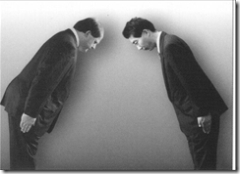
In Neil Gaiman’s Stardust, the interlude with Captain Alberic of the sky ship Perdita, a period the narrator describes as “one of the happiest” of the hero Tristan’s life, lasts a mere eight pages of the 300 odd page novel. In the film adaptation, the passage is expanded to provide copious space for Robert De Niro’s remarkable performance as a cross-dressing sky pirate. Instead of Alberic, he becomes Captain Shakespeare, and instead of a secret member of the fellowship, an organization that aids and propels Tristan toward his destiny, De Niro is a ruthless pirate who rules his crew with an iron hand and tosses his captives over the sky ship’s gunrails to their dooms. At least on the surface.
The conceit of the Shakespeare character is that what he appears to be on the outside is the opposite of what he truly is inside. In private, he is a caring, effeminate transvestite. The inner man is revealed in a memorable scene, perhaps the most memorable of the movie, in which De Niro prances and preens with a feather boa in front of a mirror, an aria playing in the background.
The scene is a looking glass homage to De Niro’s performance as Travis Bickle, taut with muscles, pistols ejecting from his homemade arm holsters, repeatedly asking of his reflection, “You talkin’ to me?” Bookends of an amazing career, the violent inner man of Taxi Driver, hinted at before the film’s conclusion only by a frightening inner monologue, becomes the public face of Captain Shakespeare, while Travis Bickle’s shy and gentle public face inverts and blooms in Shakespeare’s lace and taffeta dance routine.
Both roles play on the popular notion that there is an inner man, in each of us, who hides beneath a mask that conforms to society’s expectations. But is there really? Contemporary cognitive philosophy suggests that the inner man is simply an illusion and vestige left over from folk-psychological notions of the soul. It’s incorrigible persistence is due, among other things, to the fact that we assume our public faces are false, and that consequently there must be something behind it. Continental philosophers like Michel Foucault similarly reject the notion of a deep truth beneath our masks, and recommend, in its place, a shallow depth psychology that simply reveals more masks beneath the masks we commonly wear.
Pascal, the pre-eminent philosopher of the personal, suggested that “the heart has its reasons, that reason does not know,” to which the modern world might reply that whereof one cannot speak, thereof one must be silent. That obscure object of desire, the human heart, constantly escapes our epistemic grasp because, perhaps, it does not exist. Perhaps.
The heart is a mystery and it is of the nature of mysteries that to reveal them is to destroy them. We hide mysteries within puzzles and labyrinths, and in dark places, in order to preserve their character as mysteries. What would we do if we actually captured the Loch Ness Monster, or the Yeti, or Bigfoot in a cage? They would become mere objects of understanding, at that point, and ruin the aspect that makes them interesting — that the blurry photos may be fake, that the convoluted theories my be pipe-dreams. It is the gap between theory and understanding that gives each of these mysteries their power to fascinate. Even more prosaic mysteries, such as the Giant Squid (of which we have captured film and tentacles) and the true identity of Shakespeare, share this peculiar quality. Obscurity and doubt quicken the blood.
In Eric Rohmer’s Claire’s Knee, Jerome (who shares an amazing resemblance to Ron Silver, the liberal actor with a regular role on The West Wing who in 2004 became the spokesman for a movement called Democrats for Bush), the womanizing protagonist, passes time flirting with one sister by discussing his desire for the other, Claire. He explains that it is not sexual gratification that he desires from Claire, which, as a man of the world, he has discovered serves only to destroy the desire he feels. Instead, he has arrived at a new formula, a new object of the heart, that provides him a mystery which will not be destroyed once it is fulfilled. He substitutes the natural object of male sexual attraction with another target. Jerome maneuvers and positions himself throughout the film in order to achieve his ultimate desire, to place a hand on Claire’s knee.
In 2001, President Bush made a remarkable statement about looking into Russian president Vladimir Putin’s “heart and soul” and deciding that they could work together. The statement was remarkable not only in how wrong it turned out to be, but also in how peculiarly it was formulated. He used the metaphor of the heart in a somewhat archaic manner, or perhaps a folk-psychological manner, that seemed inappropriate to its context. Is this what high-level politics is about? We expect interrelations between world leaders to be Machiavellian affairs of manipulation and strategic interests, and President Bush suddenly proposed that this was the wrong model; that instead it was actually about getting to know each other, and coming to see the inner persons behind the political masks.
In 2008, however, the metaphor of the heart appears again as voters and pundits alike attempt to peer into the souls of the presidential candidates and attempt to evaluate their inner natures. The main stumbling block to Hillary Clinton’s campaign, it appears, is that people do not know who she really is, and in not knowing her, aren’t sure that they can trust her. Mitt Romney is currently going through the same doubts about his character, and the bugaboo of political character, flip-flopping, is beginning to be associated with his political pronouncements. Can we vote for these people when we do not know their hearts?
Hillary’s heart has become her Achilles heel — but it is not clear to me that this is a legitimate basis for electing a presidential candidate. As Gabriel Byrne observes in Miller’s Crossing, “Nobody knows anybody. Not that well.” Which returns us to the problem of the obscure nature of the human heart.
In Jean Cocteau’s Thomas L’Imposteur, the hero in the end becomes the character he pretends to be. This theme is repeated in Roberto Rossellini’s Il Generale della Rovere and Akira Kurasawa’s Kagemusha, in both of which lowly individuals, a thief in the first instance and a beggar in the second, are forced to impersonate important leaders, and in the process become those leaders, acting more heroically than the people they are pretending to be. The masks, in each of these cases, become the reality.
It is the rare person who admires Ronald Reagan the man rather than the role he performed as president. It was his ability to step into the role written for him and play it to the hilt that eventually led to the collapse of the Soviet Union — not the man that is now being revealed in his published diaries. Even in Stardust, the film, Captain Shakespeare’s crew admit that they always knew that he was a “puff.” But they did not care what he did in his private life. It was his ability to inspire fear in his crew and accomplish great deeds that they admired — it was the mask, not the man, that they saluted.
The first test of our presidential candidates has become, “Does she look presidential?” (or, as it is phrased among our elites, “Does he have the gravitas to be president?”). There seems to be recognition, at some level, that we are dealing with appearances rather than essences when it comes to our political candidates. Why, then, do we absurdly continue to inquire about a candidate’s heart, that least knowable and most treacherous of human faculties? It is the persistent illusion that we can know the hearts of these vaulted beings, or that they even have hearts, which dogs and confounds the American political process. We should, instead, look to other ways to gratify ourselves with regard to a candidate’s worthiness to be president, and her potential to play her role adequately should she assume the mantle of the presidency.
I have a want, an uncommon want, and once you hear it, you may find it hard not to desire it, also. I seek neither Hillary’s heart — a fool’s errand — nor her virtue — a mirage at best –, but a substitute for these which is both more real and more tangible. I desire an opportunity to know something which few men have known, to possess a secret that few men possess. I seek not the populist chimera’s of the politically naive, nor access to the ports of influence peddled by the politically corrupt. I want, instead, merely to brush the knee of destiny, and the thought, once planted, will not be dislodged from my imagination. I want to touch Hillary’s knee.

